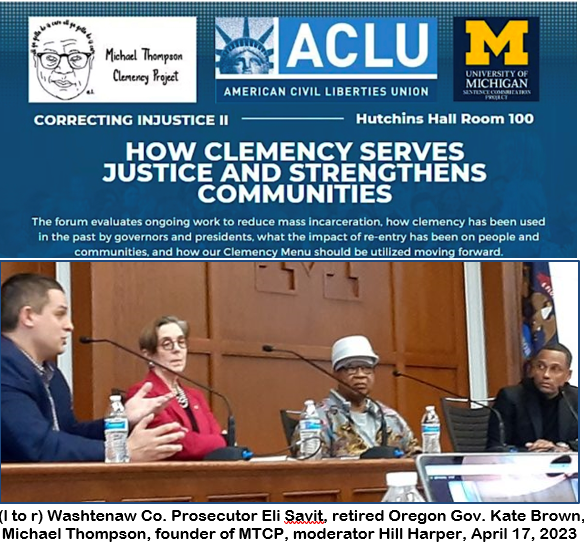 Speakers call on Gov. Gretchen Whitmer to establish clemency program for broad categories of Michigan prisoners
Speakers call on Gov. Gretchen Whitmer to establish clemency program for broad categories of Michigan prisoners
“THE SYSTEM IS BROKEN! THEY STILL HAVE THEIR FOOT ON MY NECK. THE SYSTEM IS BROKEN AND SOMEBODY NEEDS TO FIX IT.” –Michael Thompson
“I absolutely believe that the criminal justice system in the U.S. is built on the backs of Black and Brown people, and . . .that the single most powerful tool governors have to embed justice in the system—is the clemency power.” — Kate Brown, retired Governor of Oregon

By Ricardo Ferrell, VOD Field Editor and Diane Bukowski, VOD Editor
June 6, 2023
With the climate shifting in the criminal justice system, where second chances are being looked at across the board. The Michael Thompson Clemency Project, the American Civil Liberties Union, and the University of Michigan in a collaborative effort put together an event at U of M Law School April 17. The panel consisted of MTCPs own Michael Thompson, former Oregon Governor Kate Brown, and Washtenaw County Prosecutor Eli Savit, with the moderator for the panel being Hill Harper, famed actor turned activist. The conversation addressed categorical clemency and the dire need for overincarcerated individuals to be released.
Some of the people present in Ann Arbor was there in support of loved ones, friends and constituents. I posed questions to some supporters.
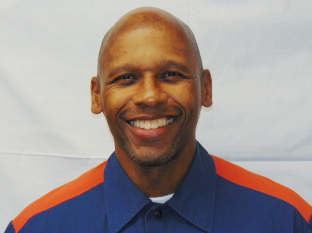
Shawn Harris/MDOC photo
Q: Can you share with VOD readers a little about who you are, and what made you attend the MTCP event?
A: I’m Carlton Turner, a native Detroiter and graduate of Wayne State University. I’m also a former prisoner who served just over 10 yrs., in Michigan’s prison system. I received an invite to attend the event and traveled from Chicago to represent my best friend of 41 years, Shawn Harris, who has served 27 yrs. on a life sentence for a very controversial and questionable conviction.
The Harris family and myself believe him to be actually innocent and are currently networking with organizations & agencies, lawyers & courts to establish his innocence and bring him home. (For more info, see: Shawn Harris | Legal Access Plus.)
Q: Mr. Turner, what was your biggest take away from the event?
A: The social consciousness, the mentality in Michigan is shifting from an over emphasis on extreme punishment for crime to a balance of fair punishment, rehabilitation and a reasonable chance for redemption upon release from prison. The people on the panel at the event, their individual views on the criminal justice system and the need for real criminal justice reform and new sentencing laws, matched the will of the people, the citizens of Michigan. And that made me realistically optimistic that change is on the horizon and that my best friend may find freedom real soon.

Ronnie Waters
Formerly incarcerated juvenile lifer Ronnie Waters, who served 40 years on a LWOP sentence received at age 17, helped the MTCP host the event. Waters, who’s been actively involved in changing the system since his release in 2020 was hired by Safe and Just Michigan and brought on as their new Community Engagement Specialist. He has been active in his community in Pontiac.
Within the first 90 days of his release he was able to meet with Oakland County Prosecutor Karen McDonald to have a discussion with her about other similarly situated juvenile lifers who hadn’t been looked at for resentencing. McDonald made a commitment to review those unheard cases for a determination on their outcomes.
Waters is a licensed lobbyist in Lansing, and has gone before both the Michigan Senate and Michigan House to testify on behalf of juvenile lifers and bring into focus the need for lawmakers to abolish life without parole for juvenile offenders. Recently, Waters has been going into high schools to talk with students about his lived experiences, journey thru prison, and delivering a message for them to stay on a pathway toward success.
Q: Mike McCurdy, would you please describe for VOD how the event went, as for having any real impact on your efforts with the MTCP?

Mike McCurdy
A: Certainly, since I joined Michael Thompson as co-director in the creation of the MTCP, we have worked tirelessly to push for categorical clemency, where many categories are looked at to draw our support. We have several people both men and women who we’re making noise about that have been in prison far too long, and they deserve a second chance. There are incarcerated folks that’s been in there 40 and 50 years serving on virtual death sentences, even though now they’re elderly, sick and incapable of any furtherance in criminality.
Q: Darryl, as a formerly incarcerated lifer who was granted clemency by Gov. Rick Snyder in 2018, can you share with VOD what you believe is needed to see more life sentences commuted?
A: Absolutely. We’re supposed to live in a society where we extend mercy to one another and believe in redemption. Those with life sentences are more likely to come out and contribute something constructive and positive to society. In general, lifers hardly ever reoffend. In fact, they make up less than 1% of the recidivism rate. To that end, a lifer review board should be formed to consider paroling more in this group.
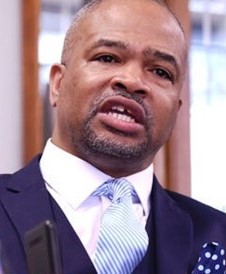
Darryl Woods
In the four years since Darryl Woods’ commutation was granted, he’s been busy helping to reform the criminal justice system. Woods was appointed to the Michigan Appellate Defender Commission by Gov. Gretchen Whitmer soon after he walked out of prison from serving life without the possibility of parole. His activism is evident in the work he’s doing with the youth and seniors in the community.
Additionally, Darryl has become a human bridge between law enforcement and the community. His aim is to work towards finding sensible ways to reduce crime and also foster better engagement with those impacted to help both sides see eye-to-eye with what’s needed to have safer communities. Woods is calling on law enforcement to receive more training which can usher in new ways for the police and the people they serve to communicate better and collectively work on the solution to an obvious larger problem.
This writer talked with Hill Harper during the event and shared some of my aspirations upon my reintegration. We connected and discussed having him, Rep. Amos O’Neal, Ronnie Waters and Darryl Woods come into the Chippewa Correctional Facility and have a serious conversation with the men about how to rethink a prison culture known for negativity and counter productivity, to that of one with substantive and meaningful possibilities, as well as affecting real change.
(Full video of clemency forum above, courtesy Mike McCurdy, MTCP)
The forum was the second event in a roll-out of the national ACLU Redemption Campaign, an effort to encourage presidents and governors to use their clemency powers to reduce mass incarceration and remedy long-standing injustices in the criminal legal system. The first forum was held at Princeton University last year. The Redemption Campaign: Embracing Clemency | American Civil Liberties Union (aclu.org)
KEY REMARKS FROM PANELISTS:
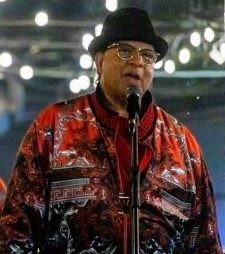
Michael Thompson MTCP founder Photo: ZClingenpeel/Mlive
MICHAEL THOMPSON: Every 10 years, we do studies but don’t do nothing about them. Millions of dollars spent and where does it go? You KNOW what the solution is. People who are doing 40, 50 years, that shit hurts, man. If it wasn’t for the Last Prisoner Project, I wouldn’t be out. It is not easy to survive after doing decades behind bars. If anybody has done that amount of time, something has happened to them. I know, because it happened to me. . . .
The person that committed that crime 30 years ago, is not the same person today. You need second chances. But you lock a person up and throw away the key—WHEN IS ENOUGH ENOUGH? SOMEBODY TELL ME! AMERICA YOU CAN DO BETTER.
There’s people out there hurting, that are getting out of prison—they’re going to turn to the streets [without support]. There’s so many things that Michigan could be doing, but they’re not even trying. Look at these young people and help.
Thompson, now 72, addressed a little-known aspect of clemency releases in Michigan, that those released spend up to four years on parole afterwards:
PAROLE AFTER CLEMENCY–“I walked out after 25 years, but am I really free? My parole officers have been trying to take me off parole, but the parole board doesn’t respond back to their own agents.” THE SYSTEM IS BROKEN! THEY STILL HAVE THEIR FOOT ON MY NECK. THE SYSTEM IS BROKEN AND SOMEBODY NEEDS TO FIX IT.”

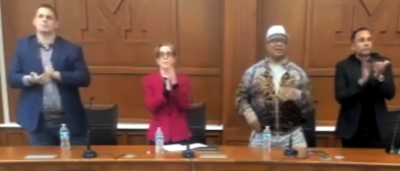
Panelists stand to applaud Jimmy Burden during clemency forum April 17. 2023.
Michael Thompson’s MDOC/OTIS page says he will be off parole on January 28, 2025, following his release on January 28, 2021.
At the forum April 17, moderator Hill Harper noted that Jimmy Burden, one of 22 prisoners granted clemency by Michigan Gov. Gretchen Whitmer in December, 2022, was in attendance. Harper had Burden stand as the audience applauded. Burden is now 68 years old.
“This man was released March 14, 2023 after serving nearly 40 years of a 60-100 year sentence for the theft of $18,” Harper said. “Can you imagine surviving 40 years of incarceration in Michigan prisons for that crime?” Burden is now 68 years old.
VOD–Can you imagine serving another four years on parole?
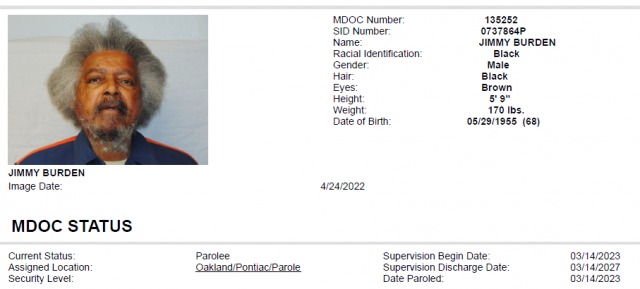
Jimmy Burden’s OTIS page

Jimmy Burden on Here to Help website.
MDOC records on OTIS (Offender Tracking Information Site), show that Burden is also serving four years on parole, not expected to be released until March 14, 2027, when he, like Thompson, will be 72.
His Supervision Conditions over the 4 years, noted on OTIS, include: not leaving the state without permission, written Consent to Search Parolee’s Person and/or Property; treatment disclosure to parole agent, complying with drug and alcohol testing ordered by field agent, no association with anyone known to have a felony record, no firearm or weapon ownership or possession, earnest efforts to find and maintain employment, comply with special conditions, written and verbal orders.
Burden has a GOFUNDME page at: Fundraiser by DAWN SARDIN : JIMMY BURDEN (gofundme.com)
KATE BROWN, Former Governor of Oregon, “I absolutely believe that the criminal justice system in the U.S. is built on the backs of Black and Brown people. I absolutely believe that the single most powerful tool governors have to embed justice in the system—is their clemency powers. They must stand up to public pressure, build a group of allies, willing to speak out into the community.

Kate Brown, Oregon Governor, retired 2022
There is an ethos out there, represented by Fla. Governor DeSantis who wants to return non-unanimous juries to the system. There must be a clear and consistent process to notify victims. Make sure safety plans are in place for those released—housing, work, all the pieces folks need to be successful, with their families and friends.
I wish Michigan Gov. Whitmer the best—I hope she’s listening in. We have to reconstruct racism out of the system. We need to provide families with housing, food, child care, education, including early childhood education. We have chosen as a country not to do this.
ELI SAVIT, Washtenaw County Prosecutor: “As the prosecutor, I represent ALL people in the community. That means of course taking stock of victims, but also defendants and their families—they’re from your community. We see people and get convictions and sentences, but we’re seeing people at a snapshot in time, when they have done probably the worst thing they are going to do in their lives. When we don’t have safety valves like clemency, commutations, we take away all hope of redemption, for change.
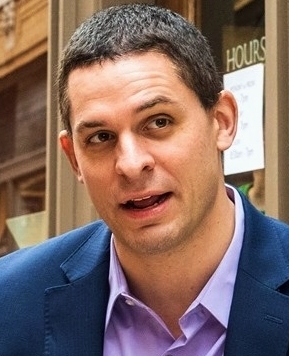
Washtenaw County Prosecutor Eli Savit
Give them a second chance. That’s the system WORKING. It means people coming home, reunited with loved ones, sons and daughters back with parents. Inter-generational trauma leads to more people hurting people and increasing crime.
Regarding marijuana convictions, it’s pretty simple—it’s not a crime in Michigan anymore. Why are there criminal records for something that is not a crime any more> It’s legal now. Why does it hold people back. People making millions off mj sales. Commutation must take stock of those changes.
The conversation around bail has gotten convoluted and stupid. People are held in jail based on their wealth—how much money do you have. They sit for days , weeks, and months. They lose their jobs and homes. Why should you be able to buy your way out of prison if you’re a murderer that happens to be rich? Get rid of the damn thing entirely—if you’re dangerous, hold you. If not, release pending trial.”
HILL HARPER, moderator—Actor/activist Hill Harper is known for his advocacy on behalf of Black youth, particularly those who have been imprisoned during decades of the mass incarceration plague that has devastated their communities. He is also a well-known television and movie actor, and holds a J.D degree from Harvard Law. He is the author of “Letters to An Incarcerated Brother,” which he discusses in the video below.
Hill now running for a seat in the U.S. Senate, subsequent to former U.S. Senator Debbie Stabenow’s retirement, supported by the Progressive Democratic platform in Michigan. He would be Michigan’s first Black U.S. Senator.




